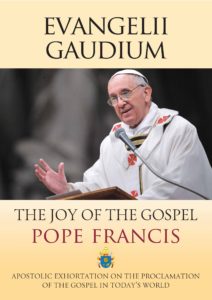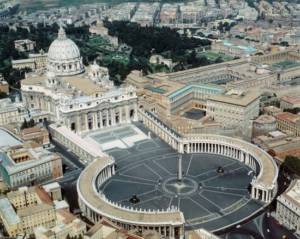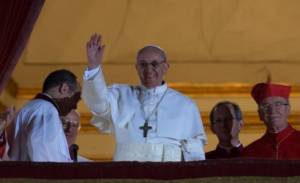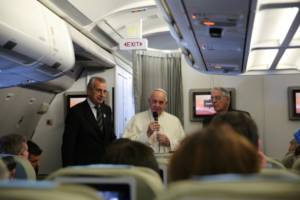My favorite saint is Francis of Assisi. Such a statement isn’t exactly novel – many people count the Poverello as their favorite. Why I am so attracted to him, however, might be a bit more unique. It is not his love for creation that most attracts me, or his embrace of poverty, although both are essential to who he is. What attracts me most about Francis is his single-minded devotion to Jesus Christ and being conformed to his image. In fact, my family has consecrated itself to St. Francis, and we wrote a prayer for this consecration that includes the line, “Through the intercession of St. Francis, we seek the grace to live out single-minded, consuming devotion to Christ, bringing the Gospel to the world in our words and actions.” And for St. Francis, this devotion was all-consuming – he thought of nothing but Christ and making him known to others. This is not the safe, environmentally-friendly St. Francis of popular imagination, nor is it the Saint of the invented quote, “Preach the Gospel always, when necessary use words.” (Did the inventor of that quote even read one life of St. Francis?). But I believe it is more in keeping with the true St. Francis of Assisi.
Although I fall far short of the ideal of St. Francis, my life as a Catholic has been an attempt to model myself after him. I find St. Francis a man after my Protestant-raised heart. All that matters is Jesus, and bringing others to him. Nothing else matters. One of my frustrations as a Catholic over the past 20+ years is to see so many Church leaders who seem to put temporal matters above the things of the Spirit. Which brings me to the Pope who took on the name of my favorite Saint.
Reserving Judgement
When Pope Francis was first elected, I, like many others, had no knowledge of the man Cardinal Bergoglio. I saw some of the warnings from traditional-minded Catholics, but honestly I figured they wouldn’t be happy unless Archbishop Lefevere was exhumed and put on the Throne of St. Peter. I saw no reason – other than him being a Jesuit, which isn’t exactly a calling card for orthodoxy these days – to think he wouldn’t be in line with the previous two pontiffs (the only popes I’ve lived under as a Catholic).
I continued in my support for Pope Francis in the early months of his papacy. I wasn’t happy with his “Who am I to judge?” quote, and I saw first-hand how it led Catholics to support homosexual acts. But the actual context of the quote wasn’t that bad, and his lack of further clarification I chalked up to his inexperience at being the most influential spiritual leader in the world. Other things he did also gave me reservations, but I didn’t want to judge the man unfairly in light of his two brilliant predecessors. Who, after all, could fill the large shoes of both St. John Paul II and Benedict XVI?
Sinking Feeling
 When the Apostolic Exhortation Evangelii Gaudium was announced, I was excited. After all, I was at the time the Director of Evangelization for a diocese, and this would be direct marching orders from the pope himself. Who in my position wouldn’t be excited? Yet as I read the document, my initial excitement became a sinking feeling in the pit of my stomach. At first I figured it was just a bad reaction to his writing style. I absolutely love the writing of Joseph Ratzinger/Pope Benedict; when I’m reading him, it is like listening to Beethoven (or perhaps Mozart, his favorite composer, is a more appropriate analogy). Again, I didn’t want to be unfair to Pope Francis; just because I don’t like his writing style is no reason to ignore what he is saying. But the more I dug into the document, the more apprehensive I got. Other than a few passages (and there are always a “few passages” that one can reference with Francis), I found nothing of the call to evangelization that I found with John Paul and Benedict (and even Paul VI!). The document appeared to be a hodge-podge of unrelated statements that had less to do with evangelization and more to do with the Holy Father’s personal favorite issues. I happened to be teaching at that time a graduate-level course on Catholic evangelization, reading all the 20th century magisterial documents on the subject, and I simply could not reconcile Evangelii Gaudium with those documents, pre- or post-Vatican II.
When the Apostolic Exhortation Evangelii Gaudium was announced, I was excited. After all, I was at the time the Director of Evangelization for a diocese, and this would be direct marching orders from the pope himself. Who in my position wouldn’t be excited? Yet as I read the document, my initial excitement became a sinking feeling in the pit of my stomach. At first I figured it was just a bad reaction to his writing style. I absolutely love the writing of Joseph Ratzinger/Pope Benedict; when I’m reading him, it is like listening to Beethoven (or perhaps Mozart, his favorite composer, is a more appropriate analogy). Again, I didn’t want to be unfair to Pope Francis; just because I don’t like his writing style is no reason to ignore what he is saying. But the more I dug into the document, the more apprehensive I got. Other than a few passages (and there are always a “few passages” that one can reference with Francis), I found nothing of the call to evangelization that I found with John Paul and Benedict (and even Paul VI!). The document appeared to be a hodge-podge of unrelated statements that had less to do with evangelization and more to do with the Holy Father’s personal favorite issues. I happened to be teaching at that time a graduate-level course on Catholic evangelization, reading all the 20th century magisterial documents on the subject, and I simply could not reconcile Evangelii Gaudium with those documents, pre- or post-Vatican II.
At this point (Evangelii Gaudium was released in November 2013), I admit, my defenses came up. While I wouldn’t say that I had become suspicious of all things Francis, I wasn’t an enthusiastic supporter anymore either. And the problems kept coming, like some form of Roman water torture. An interview here, a plane ride there, and over and over Francis’ words and actions were making me look at him in a new light. I saw a number of my fellow Catholics make light of his miscues, or even defend them, but I saw first-hand, over and over, the impact his statements were making on the average Catholics in the pews (as well as on those former Catholics who don’t fill the pews anymore). I understood that in most cases his statements didn’t directly contradict official Catholic teaching, but, honestly, that matters only to the most die-hard Catholic. To the average Catholic, as well as all non-Catholics, what the Pope says matters much more than what the Catechism states. And a pope has to realize this and take it into account when he is speaking. On countless occasions I had to defend Church teaching against what someone believed Francis was saying (and often, what he actually was saying in the most plain reading of his statements). Souls were being led astray from the Faith by statements of the Pope, and I couldn’t simply shrug it off as “no big deal” (a phrase I often heard from some of my fellow orthodox Catholics).
Evidence Mounts
As the evidence mounted that perhaps Pope Francis wasn’t that good at “poping,” I told myself to make every effort to be fair to him. After all, being a world leader whose every word is parsed and minutely examined isn’t an easy job. So whenever I heard another controversy pop up – either from the mainstream media embracing something he said, or the traditionalist Catholic media denouncing it – I resolved to ignore the headlines and reports and read the pope’s words directly. What I discovered was that often what he said, when read in complete context, was actually worse than the headline; very rarely did I discover that that controversy was simply making a mountain out of a mole-hill.
What I found in reading countless statements and documents from the Holy Father was an almost single-minded, consuming devotion to this world, and an almost cavalier attitude to the spiritual world. Never did I see any calls to conversion to Christ (in fact, I saw some explicit calls for non-Catholics NOT to convert). Instead I would read talk of climate change, refugees, and other such temporal (and usually liberally fashionable) matters. Additionally, the symbolism of the Vatican under Francis could not be any more clear as to his priorities – do I need to mention the climate change light show on the Solemnity of the Immaculate Conception, or the “Earth Hour” celebrated on the Solemnity of St. Joseph? By every indication, Pope Francis appears to put the matters of this world high above those of the next, and his priorities appear straight out of a mainstream liberal’s playbook.
Although there have been many, two Francis statements in particular stand out for me. Both came from plane interviews, naturally. In the first, Francis made his famous breeding “like rabbits” comment. Instead of praising the heroic virtue of a women who had seven children in the face of cultural opposition, he instead denigrated her by bringing up the old anti-Catholic canard of Catholics breeding like rabbits. How did this comment bring anyone closer to Christ? How did it call anyone to a higher way of living? I’ll also admit, that as the husband of a woman with seven children who endured multiple miscarriages during that time in her dedication to the Gospel of Life, I was personally hurt by that flippant comment by our Holy Father.
The second statement, however, was even worse; I’m referring to his recent comments regarding the Zika virus. He made it clear that one could “avoid pregnancy” rather than risk the possibility of having a child impacted by the Zika virus. And lest anyone misunderstand, his spokesman later clarified that he was indeed speaking of using artificial contraception. Not only is this a case of a pope publicly contradicting clear Catholic teaching, he is also suggesting that having a child born with a possible birth defect is somehow a greater evil than contraception! There is simply no way for any Catholic to justify, let alone defend, such remarks.
On a grander scale, let me just mention for a moment Laudato Si’. First, yes, I did read it. Second, I wish I hadn’t. The scientifically, economically, and prudentially problematic document shows both a person beholden to the most fashionable causes (no matter how scientifically dubious they may be), but also who considers them of the absolute highest priority. In the face of millions upon millions of Catholics leaving the Faith, a complete destruction of Catholic culture, and woeful catechesis, our Holy Father has decided to put his considerable influence behind a cause that is already embraced by the powerful of the world, and is a considerable engine for greater control of the poor by the elites.
Silencing the Critics
As I came to accept the reality that our Holy Father had dubious priorities and appeared to support positions contrary to the Deposit of Faith, I marveled at the defenses of his statements by otherwise sensible orthodox Catholics. The mental and grammatical gymnastics that they engaged in to defend what plainly could not be defended astounded me. I created this test in my mind: if Cardinal Mahoney had said the exact same thing in 1995, would these same people have made such an effort to defend it? If not, then they are simply engaging in papal positivism of the worst kind.
This takes me to a key point. There appears to exist in many parts of the Church today a dogged unwillingness to engage in even the softest criticism of the pope. Any such criticism automatically brands you a “Radtrad” or some other infantile moniker, indicating you clearly aren’t really Catholic deep in your soul as his defenders are. When I was investigating Catholicism more than 20 years ago as an Evangelical Protestant, I clearly remember being told that Catholics need not agree with everything a pope does and says, and that his words aren’t Gospel. When was that teaching changed, and why didn’t anyone tell me about it? Why is it if I disagree with a pope now – and even disagree strongly – I get tut-tutted for not being faithful, or not listening to the Holy Spirit as I should? It seems we tell our Protestant brethren one thing, then do the opposite among ourselves.
If you look throughout Church history, you see criticisms – even harsh criticisms – of the Vicar of Christ among faithful Catholics. But it seems as if the past century and a half has changed that. Although Vatican I’s definition of papal infallibility was intended primarily to limit what papal statements were considered infallible, in practice it seems to have elevated his stature beyond spiritual head to divine oracle. If you look at the writings of pre-Vatican II popes such as Pius IX through XII, you see a very strong sense of the papacy and a desire for absolute devotion to the pope’s every word.
Of course, for many Catholics Vatican II was supposed to do away with all that. And in fact, for the less-orthodox inclined, Vatican II was seen as a lever with which to challenge the authority of the papacy, a challenge that reached its apex under the pontificate of John Paul II. But the orthodox reaction was not so much to stick to strict Catholic teaching as it was to react with complete and unswerving devotion to the person of John Paul II. And his person, admittedly, attracted devotion. The cult of personality that arose under JPII continued, although with less strength, under Benedict XVI (though my friends will tell you it increased in yours truly). In arguing a point with a heterodox Catholic the means was not to consult the Catechism or the Scriptures or the tradition of the Church, it was to find a recent papal statement in our favor. That was the trump card. I was uncomfortable with that line of action back then, although admittedly I too sometimes played that card. Ultimately, as Catholics we must always remember that the Church doesn’t believe something because the pope says so, but the pope says so because the Church believes it.
The Reality of a “Bad” Pope
 All faithful Catholics recognize that the Church has seen many “bad” popes through the centuries. What does it mean to be a “bad” pope? It could mean that he simply had great moral failings, with many concubines or young boys at his disposal for personal pleasure (Alexander VI). Perhaps at a time of great doctrinal crisis, when the Church needed a strong voice from the papacy to combat error, he was silent out of cowardice, or even because he agreed quietly with the error (Honorius I). Perhaps he was a terrible person morally – perhaps he lied, schemed, and murdered his way to the papacy (pick a 10th century pope). Being a bad pope however doesn’t necessarily mean that every action he takes is evil or even that his intentions are evil. It just means he didn’t live up to the very lofty call of being the Vicar of Christ on earth.
All faithful Catholics recognize that the Church has seen many “bad” popes through the centuries. What does it mean to be a “bad” pope? It could mean that he simply had great moral failings, with many concubines or young boys at his disposal for personal pleasure (Alexander VI). Perhaps at a time of great doctrinal crisis, when the Church needed a strong voice from the papacy to combat error, he was silent out of cowardice, or even because he agreed quietly with the error (Honorius I). Perhaps he was a terrible person morally – perhaps he lied, schemed, and murdered his way to the papacy (pick a 10th century pope). Being a bad pope however doesn’t necessarily mean that every action he takes is evil or even that his intentions are evil. It just means he didn’t live up to the very lofty call of being the Vicar of Christ on earth.
But what seems inconceivable to the same Catholics who acknowledge the possibility of – and historical evidence for – “bad” popes is that they could be living under one. In fact, it doesn’t seem to enter their minds that they could live under an even mediocre one. The only possibility is that every pope they live under is blessed with intelligence, a gift for preaching, unquestioned orthodoxy, and great prudence in all teachings. Heck, the apostles themselves didn’t have a pope like that! (Sorry, St. Peter).
I’m willing to say that in many ways our current Holy Father is at best a “mediocre” pope, and in some ways even a “bad” pope. The standard I use to make this judgement is the standard of St. Francis: do the words and actions of the Pope witness a single-minded, consuming devotion to bring the Gospel to the world? Sadly, I have to admit, based on my interactions with countless “average” Catholics as well as the results of many surveys I have seen, this has not been the case with Pope Francis. In fact, many people have been led away from the Gospel by his words and actions. By saying this I might have my membership card revoked by the “orthodox Catholic” crowd, but I still believe that such thoughts are not only not unfaithful, but in fact faithful to the Gospel the Vicar of Christ is obligated to proclaim to the world.
But a few caveats. First, I do think it wrong to judge Pope Francis’ (or anyone’s) intentions. This, in fact, is the meaning behind the “do not judge” command of Our Lord’s. Francis may very well believe that his words and actions bring people to Christ. I believe strongly they do not, but I acknowledge I can’t read his thoughts on the matter. I can only look at his words and actions and their consequences. Second, I don’t consider Pope Francis the worst pope in history or a sign of the End Times. I think some critics of Francis sometimes get a bit too wound up. Even a cursory reading of Church history finds far worse popes, but we often cannot be objective about our own times. Let the future judge how “bad” he was when it can see all the consequences from a distance. Third, I don’t spend my every waking hour consumed with thinking of this pope. I pray for him daily, but I mostly go about living my faith without too much reference to him (as Catholics have always done until recently). Finally, I do not think every action of Francis is bad. On a whole I believe he has hurt the cause of the Church more than helped it, but that doesn’t mean he is some anti-Christ trying to destroy the Faith at every opportunity.
Love the Papacy, Love the Pope
 One last point. To a knowledgeable Catholic, nothing I say here should suggest that I somehow am dissatisfied with the office of the papacy or the Church in general. One attack made by the defenders of Francis is to accuse his critics of being Protestants or sedevacanists in disguise. However, I believe the papacy to be essential to Christianity and fully believe Francis is the legitimate pope. My father-in-law, who was a faithful and simple Catholic, taught his children one maxim that I think contains much wisdom: “No matter what, stay with the pope.” I agree completely with this maxim, and I try to pass it on to my kids as well. No matter who holds the office of the papacy, we must stay united to him; if we do not, we have left the barque of Peter for the sinking ship of the world. A mediocre or bad pope does not change this, nor does it give me any temptation to flee to other pastures. I would prefer death to separation from Rome, no matter what the current occupant of Rome is saying or doing. Part of St. Francis’ single-minded devotion to Christ was a deep love for the pope, his Vicar on earth. As a disciple of the Saint of Assisi, I share this love for the papacy, as well as for its current flawed occupant. Nothing he will say or do will change that love.
One last point. To a knowledgeable Catholic, nothing I say here should suggest that I somehow am dissatisfied with the office of the papacy or the Church in general. One attack made by the defenders of Francis is to accuse his critics of being Protestants or sedevacanists in disguise. However, I believe the papacy to be essential to Christianity and fully believe Francis is the legitimate pope. My father-in-law, who was a faithful and simple Catholic, taught his children one maxim that I think contains much wisdom: “No matter what, stay with the pope.” I agree completely with this maxim, and I try to pass it on to my kids as well. No matter who holds the office of the papacy, we must stay united to him; if we do not, we have left the barque of Peter for the sinking ship of the world. A mediocre or bad pope does not change this, nor does it give me any temptation to flee to other pastures. I would prefer death to separation from Rome, no matter what the current occupant of Rome is saying or doing. Part of St. Francis’ single-minded devotion to Christ was a deep love for the pope, his Vicar on earth. As a disciple of the Saint of Assisi, I share this love for the papacy, as well as for its current flawed occupant. Nothing he will say or do will change that love.





2 Comments
We have encountered “fallen away” Catholics who are very moved by Pope Francis. They are very open in their dialogue about many sensitive subjects. This has allowed us to listen and boldly teach them about many of the Truths they have confused . ( in love of course) We have invited people back to the Church and the Sacraments during this Year of Mercy. What the devil may have intended for bad, God will turn around for the good through the help of the Holy Spirit and faithful followers of Jesus.We must not despair. We must always remember, even when all seems to be in confusion………..Jesus I Trust In You. God bless you and your family always.
I agree that we can never despair – that only comes from the devil. Also, God can use anything for good – the crucifixion teaches us that. However, we must also be truthful about the situation and not ignore error and sin when it is around us.
Comments are closed.